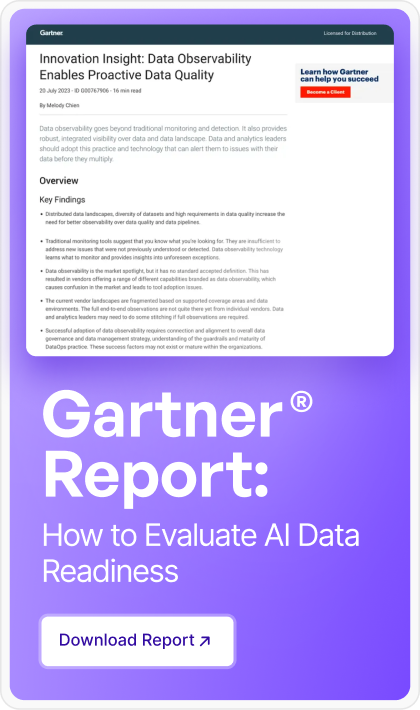Spreadsheets and static dashboards once defined a data analyst’s world. But in the current real-time, data-rich environment, AI data analysts are emerging as a decision-driving powerhouse—using machine learning, automation, and intelligent systems to uncover patterns, predict outcomes, and drive impact. By 2027, AI will initiate 95% of sales research and analytics workflows (Source: Gartner).
Unlike traditional analysts who look back, AI data quality analysts look ahead, proactively improving data fidelity and surfacing insights before they're even needed. As AI reshapes business intelligence, the question is not if data analysts must evolve, but how quickly. The future belongs to those who can analyze, anticipate, and act at machine speed.
Evolving Role of Data Analysts and AI in Complex Analytics
Traditional data analysts played a vital role in gathering, cleaning, and interpreting structured data, delivering reports, dashboards, and visualizations that helped decision-makers understand the past. But as business needs evolve, aspiring professionals must learn how to become AI data analysts capable of navigating complex data ecosystems and leveraging advanced tools to predict and shape the future.
With real-time decisions becoming the norm, static reporting models are rapidly losing relevance. In contrast, AI data analysts act as an intelligence layer between raw data and business outcomes. They use advanced machine learning algorithms to automate data preparation, uncover patterns invisible to the human eye, and generate predictive and prescriptive insights.
AI data quality analysts no longer just answer questions; they help shape the questions organizations are asking. By combining domain expertise with AI fluency, they transform data pipelines into tools that help businesses move faster, personalize experiences, and drive ROI.
How AI Transforms Complex Data Analytics Tasks
Before AI, querying massive datasets, detecting fraud, detecting anomalies, or analyzing sentiment involved slow, error-prone processes that required manual coding, rigid models, and significant time investment.
AI-powered analytics has flipped this paradigm, delivering faster, more scalable, and context-aware insights. Let’s understand how AI can help data analysts and organizations.
1. Big data querying made simple
Querying large-scale datasets once demanded deep SQL expertise and hours of processing. Now, AI-powered query engines such as Google BigQuery and Microsoft Fabric's Copilot allow analysts to ask complex questions in natural language. This reduces query time from hours to seconds and lowers the barrier to data exploration.
2. Sentiment analysis at scale
Parsing customer sentiment once involved sampling small datasets and manually coding emotions or intent. AI now enables sentiment analysis across millions of reviews, chats, and social posts in real time, capturing not just sentiment but nuance, urgency, and emotion.
A McKinsey report found that AI-driven sentiment analysis helped reduce customer service costs by 20% and incident ratios by 30%, enabling faster, more relevant responses (Source: McKinsey).
3. Anomaly detection in real time
Traditional anomaly detection relied on static thresholds that triggered false alarms or missed subtle data shifts. Today, AI models learn baseline behavior dynamically and adapt continuously.
4. Fraud detection with precision
Legacy fraud systems often flagged legitimate activity as suspicious or missed sophisticated fraud altogether. AI analytics models trained on behavioral patterns and real-time data now detect fraud within milliseconds. Mastercard's AI-enhanced detection systems have reduced false positives by 200% and improved the speed of identifying risks by 300% (Source: Mastercard).
These advances not only enhance data analysts' efficiency but also shift their focus from firefighting and data cleaning to delivering insights and accelerating decisions. AI is not replacing data analysts; it’s amplifying their value across industries.
Overcoming Challenges in Adopting AI for Data Analysis
While AI offers transformative benefits in data analysis, its adoption comes with real-world hurdles that organizations must proactively address to realize their full potential.
- Data silos: Disconnected systems and fragmented data sources limit AI's ability to deliver accurate insights.
Solution: Implement data integration platforms and unified data architectures, such as data fabrics or meshes, to create seamless information flow across departments and systems. - Skill gaps: There’s a noticeable shortage of professionals who understand both traditional data analysis and AI methodologies.
Solution: Invest in upskilling programs, certifications, and cross-functional AI training to develop hybrid talent, especially roles such as AI data quality analysts. - Integration complexity: Merging AI technologies with legacy systems can be time-consuming and risky without the right strategy.
Solution: Start with modular AI tools that support APIs and low-code integration. Collaborate closely with IT to ensure compatibility and phased deployment. - Ethical and privacy concerns: AI systems can inadvertently breach data privacy or introduce algorithmic bias if not governed properly.
Solution: Establish clear AI governance policies. Use explainable AI models, ensure regulatory compliance, and regularly audit models for fairness and accountability.
By addressing these challenges with a strategic mix of technology modernization, talent development, and governance, organizations can embed AI deeper into their data analysis workflows responsibly and at scale.
Powering the Future of Data Analytics with Acceldata
The rise of AI data analysts signals a fundamental shift in how organizations manage, interpret, and act on data. But to truly unlock the promise of AI-driven insights, enterprises need more than analytics tools—they need a platform built for trust, automation, and scale.
That’s where Acceldata delivers unmatched value. As a pioneer in data observability and control, Acceldata has reimagined the enterprise data stack with its Agentic Data Management platform. Unlike traditional, reactive tools, the platform is AI-native from the ground up—equipped with over 10 specialized AI agents that autonomously manage data quality, detect anomalies, optimize cost, and govern pipelines in real time.
With its xLake Reasoning Engine, the platform brings cognitive intelligence to cloud and hybrid infrastructure. Analysts and data stewards can query lineage, policies, and pipeline metadata in natural language, turning complexity into clarity and eliminating workflow delays. Self-learning capabilities ensure that the system evolves with your data, proactively resolving issues before they impact business outcomes.
This solution is a new operating model for enterprise-grade analytics. If your organization is scaling AI and needs resilient, automated data infrastructure, Acceldata quickly meets your needs, fast-tracking success. Discover how agentic AI data management can transform your operations. Request a demo today.







.webp)







.webp)
.webp)


